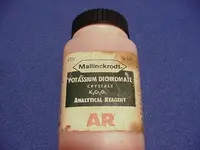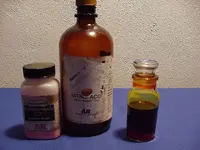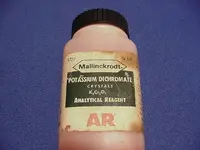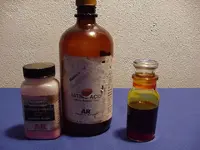RealdeTayopa said:
HI, Cub fan is quite correct. Since I handle chemicals and dangerous ones come with the appropriate warnings and antidotes, I incorrectly assumed that you would read all handling instructions.
His remarks are quite in order since we merely have to look at the way common household spray insecticides and sink cleaners etc., are handled in the average home sheesh.
Thanks cub, I will modify it. Incidentally, I have been zapped with a sub- almost -lethal dose of Cyanide through carelessness while assaying. It left me with a sensitiveness to it so that I can now smell an open cannister 20 meters away. It gives me a sense of a sickly sweet odor. I have won several bets on this unwelcome ability. heeheh.Tropical Tramp
No problem, and you're right that those of us who handle chemicals on a regular basis often forget that the average person might not consider the hazards. I often tell people that when I wear protective things like gloves, aprons, goggles, etc... when handling chemicals or training people to use chemicals I'm not implying that we should be fearful of all chemicals - what I'm implying is that we should have a healthy respect for them

I have all sorts of stories related to chemical exposure - here are just a few:
1. I had an organic professor who during every lab session just pulled a beaker off the shelf, set it on a bunsun burner and made coffee during lab. He was probably in his 50's at the time and could hardly talk due to all the wheezing and coughing and shortly after I graduated he died of cancer - was it related to his lab habits? Who knows, but I wouldn't bet against it.
2. An embarrasing story to tell about myself since I know better... I had a plugged drain in a bathtub once where we were renting. I tried a plunger and other fairly mild drain cleaning agents with absolutely no success (including liquid plumber). It was such a bad plug that after trying some of those chemicals, there was a standing mixture of water, liquid plumber etc... above the drain now and plunging it just seemed to bring up this black "yuck" that made it even messier. I went to the hardware store and found something that was like an industrial strength, strongest stuff for cleaning drains and without reading any of the warnings just poured it down (I was frustrated and in a hurry to get this cleaned out!). Needless to say I had just added a solution that was in the range of 70-85% sulfuric acid into a solution that contained sodium hydroxide (base) and sodium hypochlorite. I created what I could only describe as a vigorous chemical reaction in the bathtub that resulted in excessive heat and a cloud of chlorine gas. By the time I got the window open, a fan in there and got out, I was struck with a fit of heavy coughing that lasted for nearly 20 minutes during which time my wife called poison control and as embarrased as I was, I nearly had her take me to the emergency room!
3. I used to mess with antique furniture refinishing and found that despite all the claims by other companies selling paint strippers, the absolute best by far were those that contained high levels of methylene chloride. I used to use methylene chloride at work all the time and actually kind of liked the smell (sort of a sweet smell). I pretty much exclusively used high methylene chloride materials and often noticed that it soaked right through the gloves I was wearing (there are very specific gloves that hold up to methylene chloride). One day I started getting an itchy feeling and when I took the gloves off, my hands were all red, blotchy and itched like crazy. By the time I got upstairs to wash them, my fingers were swelling up to the point where I couldn't bend them down to make a fist. I washed them and tried to just relax and eventually the swelling went down (2-3 hours later). I just chalked it up to a weird reaction, but every time I've come in contact with Methylene Chloride - even in tiny amounts - I now have the same reaction to it. I have become sensitized to the chemical and can no longer use it for anything.
Just thought those might make some interesting stories :-)











 Is plastic cap OK? I would hate to transfer that whole bottle. Right now it is sitting upright in my warehouse somewhere safe. Does it ever go bad? Thanks for the dichromate warning. I will have to check on it. If you think I should change bottles I will. I could use another bottle for the mix, the top leaks. I have to always keep upright. Thanks.
Is plastic cap OK? I would hate to transfer that whole bottle. Right now it is sitting upright in my warehouse somewhere safe. Does it ever go bad? Thanks for the dichromate warning. I will have to check on it. If you think I should change bottles I will. I could use another bottle for the mix, the top leaks. I have to always keep upright. Thanks.